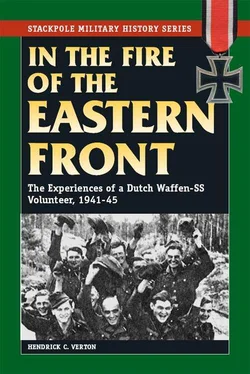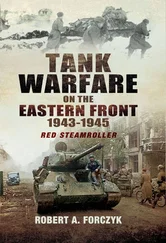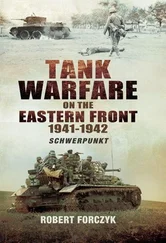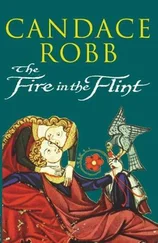The former soldier got to grips with every type of work that was offered. His willingness came from a close-knit comradeship that he had found during the war. The result was that former high-ranking, and some very senior Generals, became successful directors of many of the foremost firms. Later, as the economy improved, we also profited. Together with a former comrade, we formed our own firm in 1953, which had always been our dream. Shortly before the publishing of this book, our firm celebrated its Golden Jubilee. Our firm grew, based on a risk or two. Optimism and improvisation soon found us employing a couple of dozen men, giving them work and their daily bread. To do that we had to give our all, including many weekends, in the first years. The first vehicle in our car park was a pre-war lorry, an Adler with front-wheel drive, and a trailer. It was usually overloaded and gave us many a puncture, but that was how we visited our customers. In winter, when the motorway was iced, or if on an incline, then two of us sat on the front bumpers as ballast and we could continue on our way. That would not be permitted today, but then, we had to know how we could help ourselves. Physical efforts were the foundation of economic rehabilitation.
CHAPTER 23
Comradeship for Life
Evert and I were still living with false identities, which at some time or another had to be corrected. There was an Amnesty in 1954 which enabled us to do just that. We had to appear before a Court that understood the veiling of our identities. There was no case made against us. However, we were stateless, for Holland refused our rehabilitation. It had to stay that way for some years. Even citizens without nationality or fatherland, can be industrious, for themselves and for others. But I was not allowed in Holland with my business. My German colleagues however had the privilege of taking their business there. Seven years were to come and go, before we were reinstated as Dutch Nationals.
I can remember with clarity my very first return visit into my Fatherland after 17 years. I was deeply moved. My feelings were mixed as I drove over the border at Aachen, on the way to Maastricht, which was my first stop. My ‘passenger’ was my passport, sitting on the passenger seat, for with the safety of my family uppermost in my mind, I travelled alone on that occasion.
I must say that I was rather disappointed at being waved through with nonchalance by the border officials on the Dutch side of the border. Had I not been on the wanted list for many years? Now, armed with a new passport, and a bundle of correspondence from the Ministry of Justice, and my ‘rehabilitation’, they were not interested! All the better.
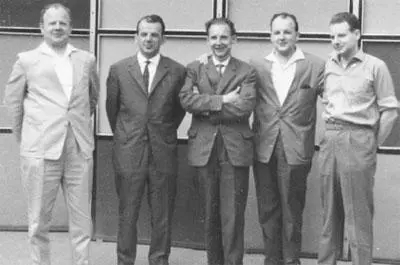
1961: the author (second from left) finally reunited with his brothers
In 17 years things had changed. Firstly, everything appeared to be smaller than I could remember. My fellow Dutch were friendly, but loud. ‘Very loud’ was my assessment, as I inquisitively watched the people on the street, like a child. They drifted here and there and were casual, and now had a far more leisurely manner. The Maastricht Agreement was not yet in force, but the coffee beans were very much cheaper than in Germany. In Holland’s oldest city I filled myself with Matjes herrings, that I had not had the pleasure of for many a year.
On subsequent visits I was able to assess that my homeland was not as it had been. No, it had changed a lot since the war, especially in the large towns. There was nothing left of the Old School mentality, now it was casual and dirty. My wife Brigitte was not impressed with the dirty towns that she saw. In Breslau I had told her with pride that even the exterior of the houses were washed in the annual spring-clean. I told her how orderly and clean my people were, and the streets spick and span. Sadly, not any more, except perhaps in the suburbs where Old School standards still prevailed, just as I remembered them.
Naturally enough there came a time when. I wanted to see my old comrades. But in Holland there was still a problem. The neighbours could not be told. They were very quickly suspicious and they were not to know about one’s past. In West Germany that was now no problem. There it was already very liberal. Groups of war-veterans were forming, who helped one another when in need. They were also assiduous in the service of searching for missing comrades. That was an urgent priority, for only in the second half of 1948 were former Waffen SS members included by the American Occupation authorities into Social Benefit laws. In other zones it stayed as it had been since 1950. There were no government social benefits or facilities whatsoever, to show gratitude for our sacrifice, or for our service to the Fatherland.
Later generations were able to recognise the ‘yoke’ under which the front-troops had bent. They bore no grudge, no ill-feelings against the State. How did we find one another? From my own post-war actions of searching for those that I knew, it was very quickly evident that our troops were widely scattered in all corners of Germany, and in places that I had never heard of. That really didn’t need any explanation. Millions had been evacuated from war-torn towns that remained empty for some time. A very happy reunion took place with Georg Haas, the former accountant of the 11th in Breslau. He put an enquiry into the military magazine Der Freiwillige, wanting to know the whereabouts of former comrades. This took place in 1956. The joy was great at seeing one another again after 11 years. He had feared that I had not survived, having been a POW under the Russians.
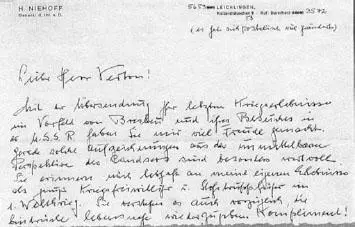
Following the war the author remained in contact with his comrades. Above is the beginning of a letter from the former commandant of Breslau during the siege, General (retired) Hermann Niehoff, thanking Hendrik for sending him his war memoirs.
In two of the books that he wrote, Brände an der Oder, and Gaben die Hoffnung nicht auf, I contributed original photos and sketches. I played a large role in them under the pseudonym Hendrik Velthoven. Both books on the ‘Stalingrad of Silesia’, in which he wrote truthfully and openly about the bitter battles, and the suffering of its citizens, were successful documents of the last months of the war.
All of us comrades were industrious in the search for former brothers-in-arms. The Waffen SS were first and foremost in the search, as was confirmed time and time again by the Red Cross and other War Welfare services. Eight years after the war there were 3.5 million missing persons. The fate of 750,000 illegally deported civilians, and 300,000 children, still had to be researched. This action reached tremendous proportions that were exclusive to the Waffen SS.
Regularly, the bands of searchers met together to exchange their findings, such as in Minden in 1956, on 5 and 6 September when 10,000 members were present! Two years later in Hamlin, 16,000 turned up. Between them all, they could solve 600 cases of missing comrades. The director of the German Red Cross at that time, Dr Pasewaldt, could report that the whereabouts of a quarter of the former units, 13,000, had been located, all from the work of the comrades, which was passed on at those reunions.
The speakers at the reunions were none other than commanders from the Armed Forces, such as General Paul Hausser, and the Generals Felix Steiner and Kurt ‘Panzermeyer’ Meyer, as well as politicians and the mayor of Minden, Dr Mosel. There were absolutely no problems with these meetings at that time. On the contrary, Dr Mosel began his speech of welcome with “My dear comrades of World War II”. He told the many who were assembled, that it was an honour for the city to be able to welcome us war-veterans.
Читать дальше
